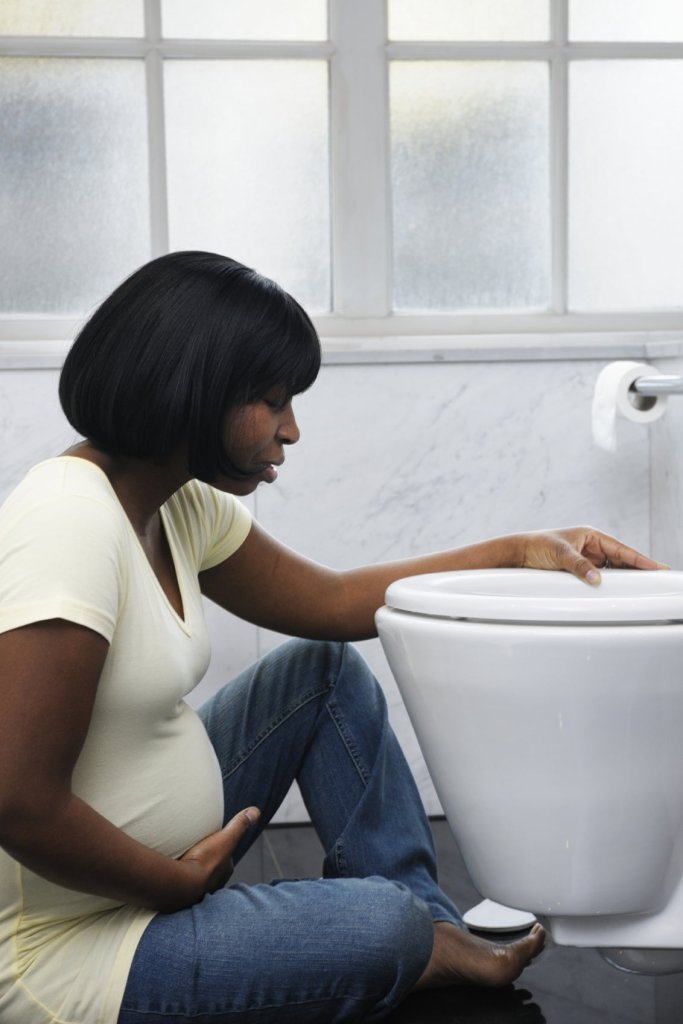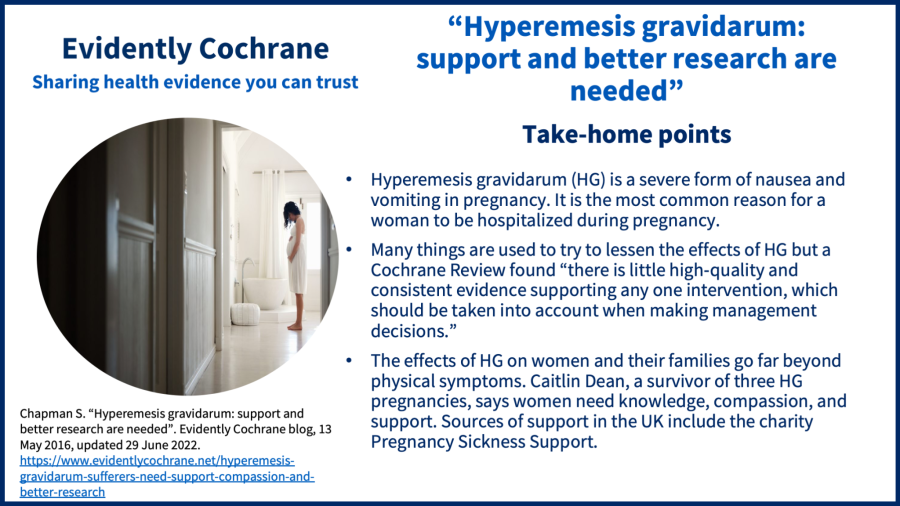In this blog on hyperemesis gravidarum (HG), a severe form of nausea and vomiting in pregnancy affecting around 1% of pregnancies, Caitlin Dean talks about surviving it and support, and Sarah Chapman looks at the evidence and the need for better research.
Page last updated 29 June 2022; page last checked 16 March 2023.
Take-home points
Hyperemesis gravidarum (HG) is a severe form of nausea and vomiting in pregnancy, occurring in around 1% of pregnancies. It is the most common reason for a woman to be hospitalized during pregnancy. Many more of us have heard of HG since Kate Middleton went through her two pregnancies suffering from it, but it wasn’t until I started reading more about it for this blog that I learned just how long-lasting this is for many women and its effects so severe that some women suffering from HG terminate their pregnancies.
HG: it’s not only nausea and vomiting

Caitlin Dean, survivor of three HG pregnancies and Chair of the UK charity supporting women with HG, Pregnancy Sickness Support (PSS), explains:
“Plenty of people can imagine that crippling nausea and near-constant vomiting for anything more than two days is not nice, even if it “for a good reason”! But really the nausea and vomiting is only one aspect of a life-changing, family-limiting, sanity-destroying condition which takes over your every waking moment for nine long and extraordinarily lonely months.
HG is not only nausea and vomiting. It is a sense of smell so powerful and warped that your loved ones can’t come near enough to comfort you without triggering retching. It is not being able to swallow your own saliva without puking it back up, so you just have to spit constantly into a towel or a cup. It is not just days lying still in a dark room but weeks and even months of it. It is not being able to eat or drink for days and being racked with guilt about the unknown harm you’re imagine your doing to your baby before it’s even formed. And then seeking help and being faced with more guilt about taking medication during pregnancy thanks to old stigmas and a lack of awareness. It’s having a life threatening condition which people tell you constantly to take ginger for!
The mental toll that all of the above takes is understandably profound. And yet, what I’ve described above is only a fraction of what HG is to the thousands of women who suffer it every year. There is also the financial toll on families, the damaged relationships, the long term complications and damage to your gastro-intestinal tract, the memories of smells that can trigger nausea and panic many years after. It becomes easy to see why Post Traumatic Stress Disorder is common after HG not just for women but their partners too.
I couldn’t wait to have babies, I had always looked forward to pregnancy, sickness and all. So when my husband and I got the little blue line and a few days later I was sick for the first time we were delighted… Morning sickness… No problem. I’d take it like the tough mama I was gunna be. What’s a bit of sickness in the scheme of growing a new life after all? A few days later I hadn’t stopped throwing up and before even my first hospital admission I was fantasizing about miscarriage or terminating my precious baby. I’d imagined I’d be an all natural, organic eating, cotton wearing earth mother avoiding all medication, alcohol and hair dye… Until I was faced with a prescription for an antiemetic and my feelings of guilt exploded exponentially.
What I have come to realise is that I am a woman that experiences HG during pregnancy and therefore I can only maintain a pregnancy with medication. But it’s not just my own preconceptions that caused my feelings of guilt; it was the whole of society, lay people and medical professionals, immediate family and total strangers who questioned my “choice” to take mediation for a condition which, prior to IV therapy and antiemetics, was the leading cause of death in early pregnancy.”
What do we know about treatments for HG?

So what help is there for women, like Caitlin, who suffer from HG? A range of different things are used to try to lessen the effects, including drugs, complementary therapies and dietary modifications. Is there good evidence to help people decide which of these they might try?
The authors of the Cochrane ReviewCochrane Reviews are systematic reviews. In systematic reviews we search for and summarize studies that answer a specific research question (e.g. is paracetamol effective and safe for treating back pain?). The studies are identified, assessed, and summarized by using a systematic and predefined approach. They inform recommendations for healthcare and research. Interventions for treating hyperemesis gravidarum (May 2016) hoped so but found that “there is little high‐quality and consistent evidence supporting any one interventionA treatment, procedure or programme of health care that has the potential to change the course of events of a healthcare condition. Examples include a drug, surgery, exercise or counselling. , which should be taken into account when making management decisions.” How disappointing.
Making research more useful
The Cochrane reviewers note shortcomings of the evidence that highlight the need for consistency in how HG is defined, for a core set of outcomesOutcomes are measures of health (for example quality of life, pain, blood sugar levels) that can be used to assess the effectiveness and safety of a treatment or other intervention (for example a drug, surgery, or exercise). In research, the outcomes considered most important are ‘primary outcomes’ and those considered less important are ‘secondary outcomes’. using validated measures, and for larger placebo-controlled trialsClinical trials are research studies involving people who use healthcare services. They often compare a new or different treatment with the best treatment currently available. This is to test whether the new or different treatment is safe, effective and any better than what is currently used. No matter how promising a new treatment may appear during tests in a laboratory, it must go through clinical trials before its benefits and risks can really be known..
Caitlin was disappointed by the lack of patient involvement in the Cochrane review and is very clear that HG research needs to involve women with experience of it, if is to be meaningful:
“None of the current measures capture what is important to women suffering. So for example, a drug may not reduce the number of hospital days she has during a pregnancy but may have prevented her terminating a wanted baby. The commonly used PUQE score also doesn’t capture the benefits of drugs which take hours of nausea from “every waking moment” to say, 10 hours per day, which again can make the difference between continuing the pregnancy or not. The definition of HG is also problematic as admission to hospital is far from sufficient, as many women terminate (which is surely the worst fetal outcome) having been denied access to secondary care.”
Caitlin, along with the PSS trustees and volunteers, strongly disagrees with proposals to conduct placebo-controlled trials of antiemetics. “They’ve been around for years and they have been established as antiemetic drugs in placeboAn intervention that appears to be the same as that which is being assessed but does not have the active component. For example, a placebo could be a tablet made of sugar, compared with a tablet containing a medicine. drug trials in other lower riskA way of expressing the chance of an event taking place, expressed as the number of events divided by the total number of observations or people. It can be stated as ‘the chance of falling were one in four’ (1/4 = 25%). This measure is good no matter the incidence of events i.e. common or infrequent. conditions, where the risk of terminating a wanted pregnancy doesn’t exist. We don’t need placebo trials to see if antiemetics are still antiemetics. I’ve asked for women’s views on placebo trials in HG. It’s a unanimous no… It won’t work because women won’t be recruited to it and it’s unethical.
Stigma, isolation, lack of awareness…
“Nausea and vomiting and other physical symptoms are only half the battle”, Caitlin tells me, “the half which we don’t really have a cure for. But the other half of the battle… The guilt, the stigma, the isolation and financial burden, the lack of awareness and suggestions of ginger. They are things which we can choose to end for women here and now with support, compassion and knowledge.” This is what Pregnancy Sickness Support aims to do.
Let’s hope that future updates of the Cochrane Review will be able to provide better evidence for women about available treatments, drawing on research that uses an agreed definition of HG and a core outcome set developed with women with experience of HG working alongside researchers. Meanwhile, the work of people like Caitlin and the PSS volunteers can do much to raise awareness and support women with this condition.
More information and support
NHS page on Severe vomiting in pregnancy
Not specific to hyperemesis gravidarum but the MuMPreDiCT team is working to improve care for women with two or more health conditions. We have a blog about it: Contemplating pregnancy with long-term health conditions.
HER Foundation – a non-profit organisation “dedicated to helping those suffering hyperemesis and those who have survived it.”
The photograph of Caitlin Dean and children is reproduced here with Caitlin’s permission. Other images were purchased for Evidently Cochrane from istock.com and may not be reproduced.
Sarah Chapman has nothing to disclose.




My daughter is having twins and it’s her 1st pregnancy. She was so happy when she found out she was pregnant. She is now 25 weeks and is yet again in hospital. She has been sick so often she is also coughing up blood. Dur to the lack of food and water her keystones are also now extremely high. She had to leave work today as she is now spending so much time in hospital. While in hospital the medication is given in a drip and this helps, however the tablet versions do not. She is unable to keep them down. Much more research is needed and quicker support for mums to be. It has affected every part of her life. It’s awful for her. As well as the other after effects it could also make bonding with the babies much harder for a new mum. So much bonding is done juring the pregnancy and my daughter is missing out on this.
That sounds really tough… I hope she can find some good support from others who have experienced this and finds the blog useful.
Best wishes,
Sarah Chapman [Editor]
Hi Donna, we are in the exact same situation and was wondering if there were any specific ways your daughter dealt with this? my wife is now 8 weeks into her pregnancy.